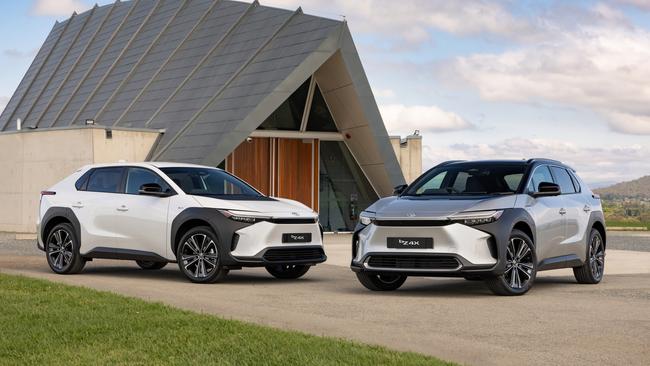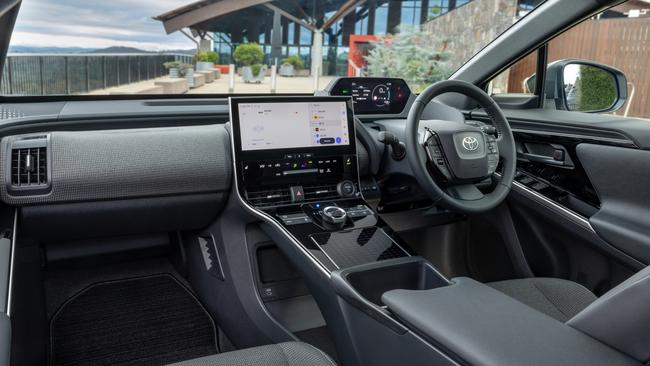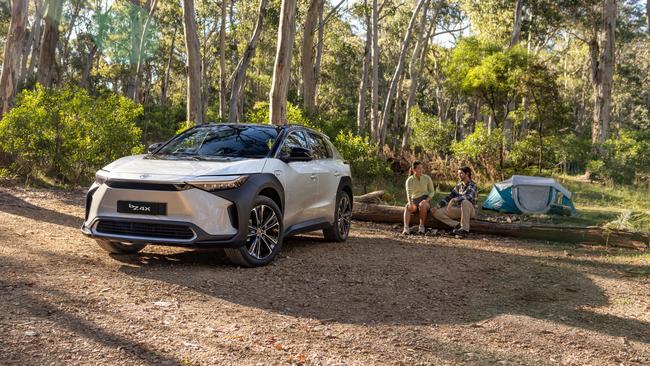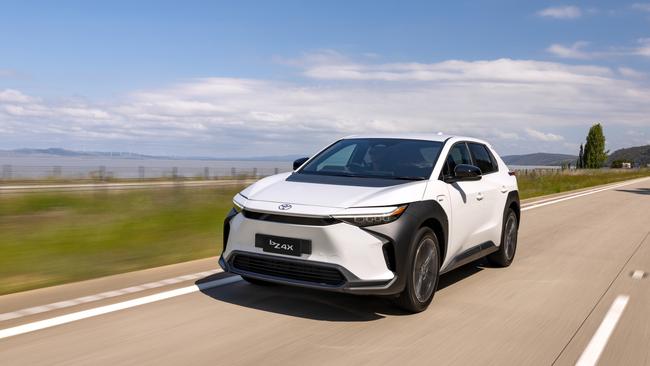Toyota takes on EV problem with new product
The dollars don’t always add up for people considering a switch to green power, but a new approach from Toyota could make the difference.
Motoring News
Don't miss out on the headlines from Motoring News. Followed categories will be added to My News.
Toyota has launched its first full electric vehicle, the bZ4X SUV, just as EV demand and potential resale values are on rocky ground.
The car giant’s new EV, which is slightly larger than its combustion engine RAV4 stablemate, starts at $66,000 before on-roads.
The cheapest petrol-powered RAV4 starts from $39,760 – some $26,000 cheaper.

Reacting to the current climate of EV uncertainty, Toyota’s introduced an all-encompassing lease deal, a first for the brand in Australia, to “take away the concerns being expressed globally about residual values of battery electric vehicles.”
In Europe, many carmakers have slashed prices of new EVs, responding to weaker than expected demand and negative press surrounding tanking resale values.
European and North American figures show, in general, electric vehicle resale values have suffered far greater falls than combustion cars.
Here in Australia, the Toyota BZ4X’stwin-under-the-skin Subaru Solterra, also launching this week, saw its retail price slashed by up to $8000 to $69,990 plus on-roads to better meet the market.

Australia’s best-selling EV – the similar-sized Tesla Model Y – costs from $65,400 plus on-roads, undercutting these fresh Japanese rivals.
For those not wanting to buy outright, Toyota’s “full service” lease deal means customers make monthly repayments for a brand new bZ4X, which covers registration, insurance, service, tyre replacement, roadside assist and connectivity subscriptions.
Toyota Australia’s vice president of sales and marketing, Sean Hanley, said it was a “hassle-free alternative for battery electric vehicle intenders”.
But the lease deal isn’t cheap.

The cost varies by a customer’s location and annual kilometres – it will be tailored to suit each individual – but you’ll likely need to spend around $1700 per month for the $66,000 single motor bZ4X, or approximately $1900 per month for the higher-spec dual motor version.
The lease deal, for now, is for three years: no more, no less.
That would mean customers would fork out at least $20,400 per year, or $61,200 over three years, and never actually own the EV.
It looks very expensive on paper, but at least there should be no nasty surprises.
EV insurance is notoriously expensive, and resale value risks are swallowed up by Toyota.
“In short, we’ll take care of everything, including the residual,” Hanley said.
“It’s a one-stop shop with running costs bundled into a monthly payment.”
Toyota acknowledges a full-service lease won’t be for everyone.
“Some customers will prefer our traditional finance products, and we understand that,” said Hanley.
At the end of the lease, customers have the option of handing the car back to the dealer, lease it again, or move on to another new Toyota.

In a veiled dig at market disrupters like BYD and Tesla, Hanley said its customers know that “unlike many other companies offering battery electric vehicles, we’ve been operating in Australia for a long time. And while there are always challenges, they trust Toyota will look after them.”
As a sweetener, Toyota said all applications made by June 30 and delivered by year’s end would receive a complimentary 7kW home charger, or a subsidy towards a bigger unit if they have three-phase power.
They also receive an additional two years of Toyota’s connected services.
Toyota Australia’s mantra is “no one is left behind” when it comes to this EV revolution.
This includes novated leases, allowing customers to benefit from the fringe benefits tax (FBT) exemption, which has expedited the take-up of EVs in Australia
. Our best-selling brand is being realistic about the uptake of its first EV.
Toyota forecasts 1500 bZ4X sales – full retail and lease deals included – in its first 12 months on sale.
Last year Tesla sold almost 29,000 Model Y SUVs.
Originally published as Toyota takes on EV problem with new product


